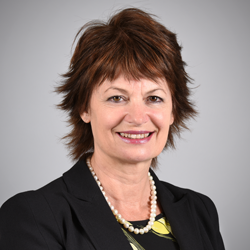
Delivering the Significance lecture at the close of RSS Conference yesterday, Dame Anne addressed the challenge of communicating evidence to the public, and to the policy makers and politicians who are best placed to put that evidence into practice. However, scientists and policy makers don’t always speak the same language, hence the title of her talk, ‘Lost in translation’.
Dame Anne has extensive experience trying to bridge the communications gap between science and policy. Alongside her research work in the field of biology, she also has the distinction of being the first Chief Scientific Advisor to the President of the European Commission, from 2012 to 2015, and prior to that, from 2006 to 2011, she was the first Chief Scientific Advisor to Scotland.
Recalling her time spent working for former Commission president José Manuel Barroso, Dame Anne said “he was really quite passionate about science” and was “someone who wanted to listen” to what science had to say. However, she said: “It became clearer and clearer to me that the translation of [scientific] knowledge into something meaningful, that could be used at the sharp end [of policy making]… that was not as straightforward as I thought.”
There are many challenges, not least the separation of ‘facts’ from ‘opinion’. Dame Anne gave the example of Mohamed Al-Fayed, who commissioned some survey research and found that 85% of the public thought Princess Diana had been murdered (alongside Al-Fayed’s son, Dodi Fayed). That 85% figure is a ‘fact’, of course, but it is not credible evidence of anything other than what people believe.
Science provides the means to tell us what is, and what isn’t, credible evidence, Dame Anne said – but there is also the question of how far the public actually trust those delivering the evidence. Scientists are reasonably well trusted: 79% of those surveyed in an Ipsos Mori poll said they trusted scientists to tell the truth. That’s below doctors, teachers and judges – who have trust ratings above 80% – but it is substantially better than journalists and politicians, who are trusted only by a quarter of people, or fewer.
Dame Anne said she was deeply troubled by lack of trust in politicians. But equally concerning is the fact that, while journalists are not trusted, we – as a society – tend to get our evidence from newspapers, and, on far too many occasions, complete myths are reported in papers as facts.
These ‘facts’, as presented in the media, inevitably lead to problems, such as the deep disconnect between the risks people are worried about and the hazards they actually face. Terrorism is one example, where fears are much greater than the risks, said Dame Anne. Electrosmog is another: people seem much more worried about the risks of this “invisible electromagnetic radiation” than they are about the risks of car accidents.
Managing risk – and public perception of risk – is a particular challenge for politicians. After all, ‘credible evidence’ does not mean ‘definitive evidence’. Probabilities are often involved. A high probability of a high impact event is easy enough for politicians to deal with. This sort of ‘critical risk’ needs to be avoided. Similarly, politicians can comfortably ignore low probability, low impact events. The problem, Dame Anne said, has to do with low probability, high impact events. Deciding how to deal with these sorts of issues often involves political considerations. For example, not dealing with an event that might lead to the extinction of a species of newt is unlikely to kill a political career, but one that could cause a handful of human casualties is a different matter altogether.
It is in these sorts of scenarios that politicians might decide to ignore the scientific evidence and to proceed with what seems to be right to them, politically. But if they do so, Dame Anne believes they should be made to explain why the evidence was overlooked. Consider current policies for the evacuation of the London Underground in the event of the release of a toxic powder. Dame Anne said that the science is clear: the best way to deal with such a scenario would be to seal off the Tube immediately, leaving those trapped underground to their fates. But that’s not what we would do: we, as a society, would rather take on a small amount of risk to save those in harm’s way. It is the human thing to do, she said.
As for the scientists themselves, what can they do to help politicians navigate these grey areas of policy making? “We need to be honest when we speak,” said Dame Anne. “We need to be honest about the facts we have and don’t have, and we need to show empathy for public concerns.” Perhaps most importantly, though, she said: “We need to offer options for action, rather than claiming to have the ultimate solution.”




